Introduction
I’ve covered so many excellent and informative books in this column that the idea of picking a handful for a ‘best of’ feature was initially daunting. However, since we appear cursed to live in interesting times, a theme rapidly suggested itself. Physicist David Deutsch has written that civilisations don’t fall directly from the problems of ecology, economy, violence or disease that beset them (I’m sure I need draw you no parallels), instead they fall from a failure of imagination when societies come to believe that no solutions are even possible.
It can be hard to see the forest for the trees so I thought I’d refrain from the joys of cosmology, technology, AI and biology and instead present you with works that help lift your gaze past the looming trunks of despondency to the sylvan glades of possibility beyond.
Factfulness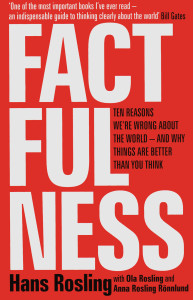
by Hans Rosling
Published by Sceptre www.sceptrebooks.co.uk
At every level from school children to UN administrators, the human race seems addicted to doom and gloom. It’s an opinion formed in diametric opposition to the reality, Rosling says, that almost everywhere, almost everyone is better off than ever. We stand in a better place than our parents because of their actions, as they did because of their parents; an almost imperceptible generational hoisting on the shoulders of a million giants. Rosling gives us the numbers to back it up along with graphs, lots of graphs. Granted, some of their happy little lines would be taking a bit of a dip if they were extended to this last year but progress isn’t a smooth curve and it’s not automatic – we have to work at it. Still, look how far we’ve come says Rosling, and, with diligence and effort, how far we can yet go.
Utopia for Realists / Humankind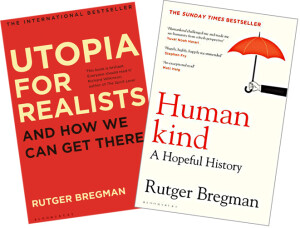
by Rutger Bregman
Published by Bloomsbury www.bloomsbury.com
OK, I’m cheating a bit here with a straight up ‘twofor’ but these two books are sort of complimentary; ‘Utopia’ dealing with society at large and the just released ‘Humankind’ concentrating on human nature. Bregman is an ‘angry young man’ version of the late Hans Rosling. Tumultuous to Rosling’s ebullience, Bregman’s arguments are not quite as polished but he is equally passionate about countering our collective doom addiction. ‘Utopia’ and ‘Humankind’ are bulwarks against the sea of despair and despondency served up by news and social media – litanies of grounded optimism with humane, real-world examples tackling problems in the economy, education, crime, violence, democracy and more.
Behave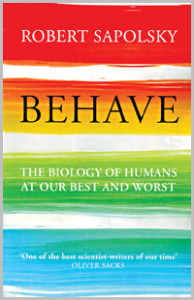
by Robert Sapolsky
Published by Bodley Head/Penguin Random House www.penguin.co.uk/vintage
When it comes to the mind I was especially spoiled for choice. I could have picked ‘The Irrational Ape’ or ‘The Idiot Brain’ or ‘The Intelligence Trap’ but in the end I eschewed the definite article and went with ‘Behave’; Neurobiologist Robert Sapolsky’s wide ranging magnum opus. In 2017 I called this book “an extraordinarily relevant and significant work”. Over the last three years of ever more fractionalised and polarised public discourse, that significance has only increased. ‘Behave’ is an unflattering, and occasionally grim, mirror revealing the origins and consequences of our many subconscious flaws and faults but also shows how we can circumvent the worst in ourselves.
Empty Planet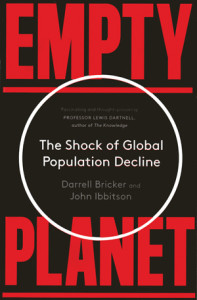
by Darrell Bricker and John Ibbitson
Published by Robinson www.littlebrown.co.uk
David Attenborough thinks we have to control human population to save the planet. Well, job done then. Bricker & Ibbitson do the legwork here to show that the population bomb has run out of steam. There are fewer Millennials than Boomers and fewer Gen Z-ers than Millenials. In almost every continent – Europe, North America, China, Russia, large parts of South America – the birth rate is already below replacement level and falling. Good news for the planet is bad news for the economy though with declining births meaning fewer new workers and tax payers.
Lifespan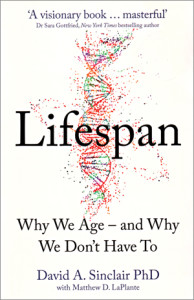
by David A. Sinclair PhD with Matthew D. LaPlante
Published by Thorsons www.harpercollins.co.uk
If we’re not going to have enough young people, why not keep the old ones? Sinclair is a geneticist specialising in ageing (LePlante is the writing half of the duo). His position gives him, he claims, a ten year heads-up on the sort of drugs and treatments we’ll be taking to live longer, healthier lives. His life extension vision is less ambitious than some (and more credible for it) promising, not eternal youth, but extra decades of health and vitality. It’s a future of beguiling promise where (fingers crossed) 90 year old marathon runners and teachers are the rule rather than the exception.
Conclusion
In George Pal’s 1960 version of “The Time Machine”, Philby notes that his friend has returned to the far future with only some books from his library to help build civilisation. ‘Which books would you choose?’ he wonders. Well, these would be my choices. While full of imaginative solutions they can’t quite give us a roadmap because there isn’t one sure path to a better future. Collectively however, they do clearly illuminate a preferred direction of travel. The route we choose is up to us.